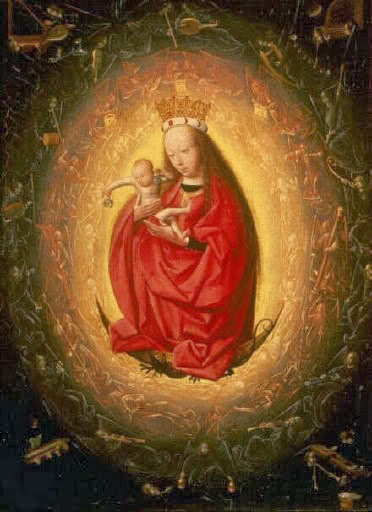Holy Week, Good Friday,
John 19: 1-15
Then Pilate took Jesus and had
him scourged. The soldiers braided a crown of thorns and put it on his head,
and threw a purple cloak around him, walked up to him and said, “Hail, King of
the Jews!” and struck him in the face.
And again Pilate went out to them and said, “Behold, thus I bring him
out to you, so that you may know that I find no guilt in him.
And Jesus came out, wearing the crown of thorns and the purple cloak.
And Pilate said to them, “Behold, the man!” [Behold, this is Man!]
When the chief priests and the Temple attendants saw him, they shouted,
“Crucify him, crucify him!”
Then Pilate said, “Take him yourselves and crucify him, for I find no
guilt in him.”
Then the Jewish leaders replied, “We have a law, and according to that
law he must die, because he has made himself a Son of God.”
When Pilate heard these words, he was even more alarmed, and again he
went into he courthouse and said to Jesus, “From where have you received your
mission?” But Jesus gave him no answer.
Then Pilate said to
him, “You will not speak with me? Do you not know that I have the power to
release you and also to crucify you?”
Jesus answered, “You would not have power over me unless it had been
given to you on high. Therefore the greater burden of destiny falls upon him
who handed me over to you.”
From then on, Pilate tried to set him free. But the people shouted, “If
you release him, you are no longer a friend of Caesar, for everyone who makes
himself a king is against Caesar.”
When he heard these words, Pilate led Jesus out, and sat down on the
judgment seat in the place called the Pavement, in Hebrew Gabbatha. I was the
day of the preparation of the Passover Festival, about midday. And he said to
the people, “Behold, this is your King.” But they shouted, “Away with him, away
with him, crucify him!”
Pilate asked them, “Shall I crucify your King?”
And the chief priests answered, “We have no king but Caesar!”
 |
| Dottori |
Good
Friday
April
6, 2012
John
19
The
awful stillness of Good Friday begs the question: Was Christ truly overcome on
the cross? What really happened?
The
outer fire of His will showed itself so masterfully at the beginning of the
week, in the cleansing of the temple and the intense discussions with the
Pharisees and Saducees. Now that will-fire goes deeper. He pursues, on both
higher and deeper planes the demonic powers. He fights against the Luciferic
powers, those glittering beings of deceptive light who want to estrange us from
the earth, while we live on earth. He fights against the satanic powers who
want to harden us and to fetter us to dead matter. They would thus rob us of a
connection with the earth and with our loved ones after death—for it is
only a spiritual connection, a living heart connection with the earthly that
survives in the afterlife. In the stillness of Good Friday, Christ is following
the satanic powers into their hiding place in order to overcome them there.
In
the Garden of Gethsemane, he wrestled with a death that would have been
premature. With the mightiest force of prayer ever known on earth, He wrestled
to remain in the body. Christ was victorious and death is repulsed.
And
on the cross He wills to remain still united with the earth when He goes
through death. He wrestles to enter still more deeply into the world of earthly
matter, which is His body. He will not abandon this last remnant to the Prince
of this World. And when the earth quakes, all the demons of the earth seem to
storm forward to help the satanic death power to victory.
However, death cannot strip Christ of the
sovereignty of His spirit. It cannot strip Him of His authority over all earth
existence. When Christ says, ‘It is finished’, He is referring to the complete
conquest over death. The Christ, in dying, goes directly into the earth. The
blood streams from His wounds and his soul, in love, goes with it into the body
of the earth. The body that hangs on the cross begins to radiate light, like a
gilded figure on a black cross. The radiant Sun of Christ weaves a ray of
Easter into the darkness of Good Friday.
With
His burial, His body goes into the earth as well. The earth receives the body
and blood of Christ, the great communion. It is the medicine for the
spiritualizing of all material existence—the medicine that makes whole.
Goethe
hints at the amazing power of this event:
Smoothly and lightly the golden seed by the furrow
is cover'd;
Yet will a deeper one, friend, cover thy bones at
the last.
Joyously plough'd and sow'd! Here food all living is
budding,
E'en from the side of the tomb Hope will not vanish
away.[1]
[1]
Johann Wolfgang von Goethe, “To The Husbandman”
See Holy Week, a Spiritual Guide from Palm Sunday
to Easter, by Emil Bock.



